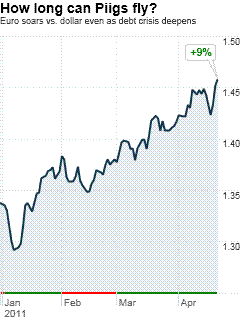Not that you'd know the difference to look at the market. The annual cost of insuring $10 million of Greek debt soared past $1.4 million this week, and the yield on 10-year Greek bonds hit an eye-watering 15%. Credit spreads hit new highs in Ireland and Portugal too.
Investor flight from Greece, Ireland and Portugal has the makings of an existential problem for the euro zone. The European Union has spent the past year bailing out weak states and their too-big-to-succeed banks, without addressing the productivity problems that laid the weaker states low in the first place.
Yet the euro, thanks to the inflation-squashing vigor of the European Central Bank, is now trading within 10% of the all-time high it hit against the dollar in 2008, just before the global economy came apart at the seams. The higher the euro goes, the more stress on laboring European economies. How long can this go on?
In an ugly new twist on Keynes' aphorism, it is starting to look like the market can stay irrational longer than Europe's weaker states – or their banks -- can stay solvent. When investors finally catch on, the fall could be brutal.
"We're peering over the precipice right now," says Scott Minerd, chief investment officer at Guggenheim Partners. He is betting the euro will fall from a recent $1.46 (see chart, right) toward parity with the dollar or even beyond, as investors finally divine the extent of Europe's problems: "There is just no way out when you start to add up all the numbers."
The unhappy math starts with the banks. In a replay of the subprime crisis here, the banks in Europe are politically powerful -- but financially weak, largely opaque and highly exposed to the worst case scenario, in this case a sovereign default.
The three weak European states account for just 5% of annual European Union economic output. But EU banks hold $147 billion of Greek sovereign bonds and $115 billion of Irish and Portuguese debt – including $108 billion of bonds held by EU banks outside those countries.
And if anything, keeping the banks healthy over there is more important to growth than it is here. Banks are responsible for 74% of credit extension in the euro area, the Organization for Economic Cooperation and Development estimates. That compares with just 24% in the land of Fannie Mae mortgages.
"The problems start with weak capitalization and a lot of interconnectedness, which means problems in one place can easily become systemic," says Daniel Gros, director of the Center for European Policy Studies in Brussels. "But it's hard to put a number on exactly how bad it is."
Confidence in the banks hasn't been helped by regulators' failure to include a sovereign default in the stress tests they are running again this spring. Fears about what the banks really look like could kindle a flare-up of the sovereign debt crisis into a regional headache into a Continent-wide contagion.
So far, the ECB and European politicians have done just enough to keep the pot simmering without rolling into full boil. But the weak states remain vulnerable to a loss of confidence by depositors.
It is an international bank run that pushed Ireland into its unpopular bailout last fall. Deposits held at Irish banks by nonresidents plunged 49% from a year ago through February, Minerd estimates.
So far, there is no evidence of a run on Portuguese banks. But Gros worries what might happen if funds start fleeing from Greece -- let alone Spain, which is much bigger than any of the bailout three. Its banks could face rising losses as the ECB raises rates, punishing an economy already laboring, if you will, under 20% unemployment.
"I don't really see a solution in Greece or Ireland or Portugal that doesn't involve haircutting the debt," Minerd says. As that plays out, he adds, "We are looking at a massive credit crunch in Europe over the next 18 to 24 months."
The dollar, believe it or not, also rises.
